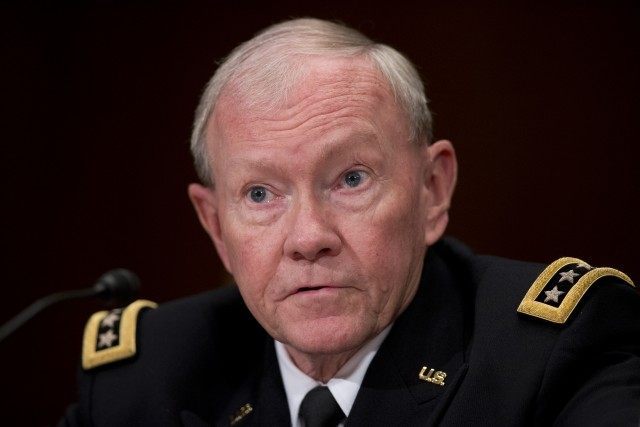Gen. Martin Dempsey, the highest-ranking military officer in the United States armed forces, conceded that Iran will use the sanctions relief funds it is expected to receive under the nuclear deal “to propagate” its “revolutionary ideology,” which it has done in the past through the use of proxy terrorist groups.
“The big question on the table is whether this relief of sanctions that will flow to Iran will be used to improve their economy or the lives of their citizens, or whether they will use it to propagate their revolutionary ideology,” Gen. Dempsey, chairman of the Joint Chiefs of Staff, told members of the Irish Defense Force in Dublin on August 18. “The answer is probably a little bit of both.”
A day after the nuclear deal was announced, President Obama admitted that Iran will likely use sanctions relief money to fund terrorist organizations it uses as surrogates such as the anti-American, anti-Semitic group Hezbollah, which was founded in the early 1980s with the help of Ayatollah Ruhollah Moosavi Khomeini in an effort to export Iran’s Islamic Revolution.
Ayatollah Khomeini is the founder of the Islamic Republic of Iran and the leader of the 1979 Iranian Revolution. Iran is able to maintain its commitment to Khomeini’s doctrine of jihad and export Revolution by supporting terrorist organizations.
Under the July 14 nuclear pact between Iran, the United States, and five other world powers, the Islamic Republic is expected to reap significant economic benefits, given that many sanctions levied against Iran will be suspended as Iran’s commitments to complying with restrictions on its nuclear program are verified.
Some analysts estimate that as much as $150 billion in Iranian assets could be unfrozen once the sanctions are lifted.
Obama administration analysts claim that Iran will have about $56 billion at its disposal after paying its outstanding financial obligations, such as the billions it owes China for infrastructure projects.
Iran continues to conduct malign activities that U.S. officials acknowledge are a cause of concern. Those activities include the use of proxies such as the Lebanese-based Shiite terrorist group Hezbollah and the Iranian Revolutionary Guard Corps-Quds Force (IRGC-QF), as well as proliferating ballistic missile technology, cyberattacks, weapons trafficking, and maritime interdiction.
Gen. Dempsey indicated that the question now is whether the international community can separate the nuclear issue from Iran’s nefarious activities.
The issue with Iran is “to be determined,” said Gen. Dempsey.
Citing the administration’s “best analysts,” President Obama on August 5 claimed that Iran will devote the bulk of its sanctions relief revenue to “spending that improves the economy and benefits the lives of the Iranian people.”
Nevertheless, during that same speech, he acknowledged that the Islamic Republic will use some of the money to proliferate its terrorist activities.
“Let’s stipulate that some of that money will flow to activities that we object to… Iran supports terrorist organizations like Hezbollah,” conceded the U.S. president. “It supports proxy groups that threaten our interests and the interests of our allies — including proxy groups who killed our troops in Iraq.”
“The truth is that Iran has always found a way to fund these efforts, and whatever benefit Iran may claim from sanctions relief pales in comparison to the danger it could pose with a nuclear weapon,” he added.
On July 15, a day after the deal was announced, Obama made similar acknowledgements.
“Do we think that with the sanctions coming down, that Iran will have some additional resources for its military and for some of the activities in the region that are a threat to us and a threat to our allies? I think that is a likelihood that they’ve got some additional resources,” said President Obama. “Do I think it’s a game-changer for them? No.”
“They are currently supporting Hezbollah, and there is a ceiling — a pace at which they could support Hezbollah even more, particularly in the chaos that’s taking place in Syria,” he added. “So can they potentially try to get more assistance there? Yes.”
Hezbollah maintains a prominent presence in the Western Hemisphere.

COMMENTS
Please let us know if you're having issues with commenting.